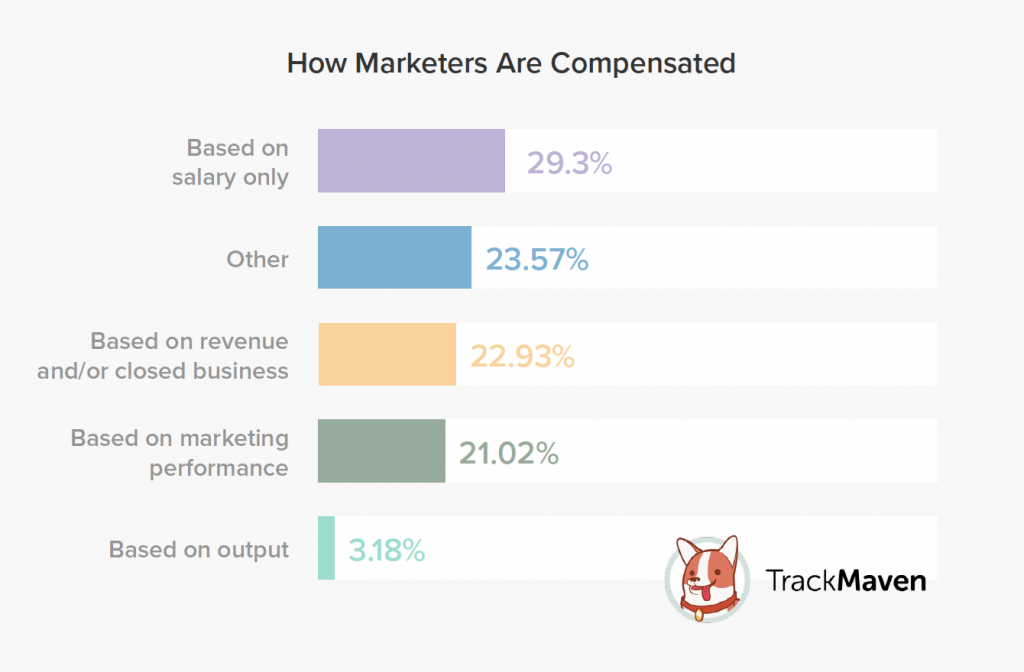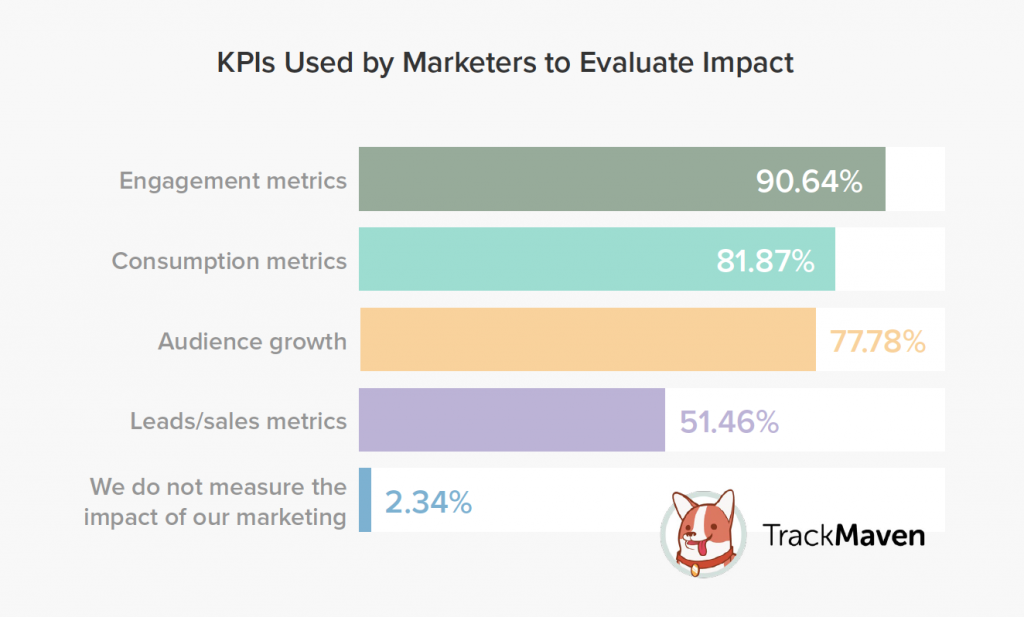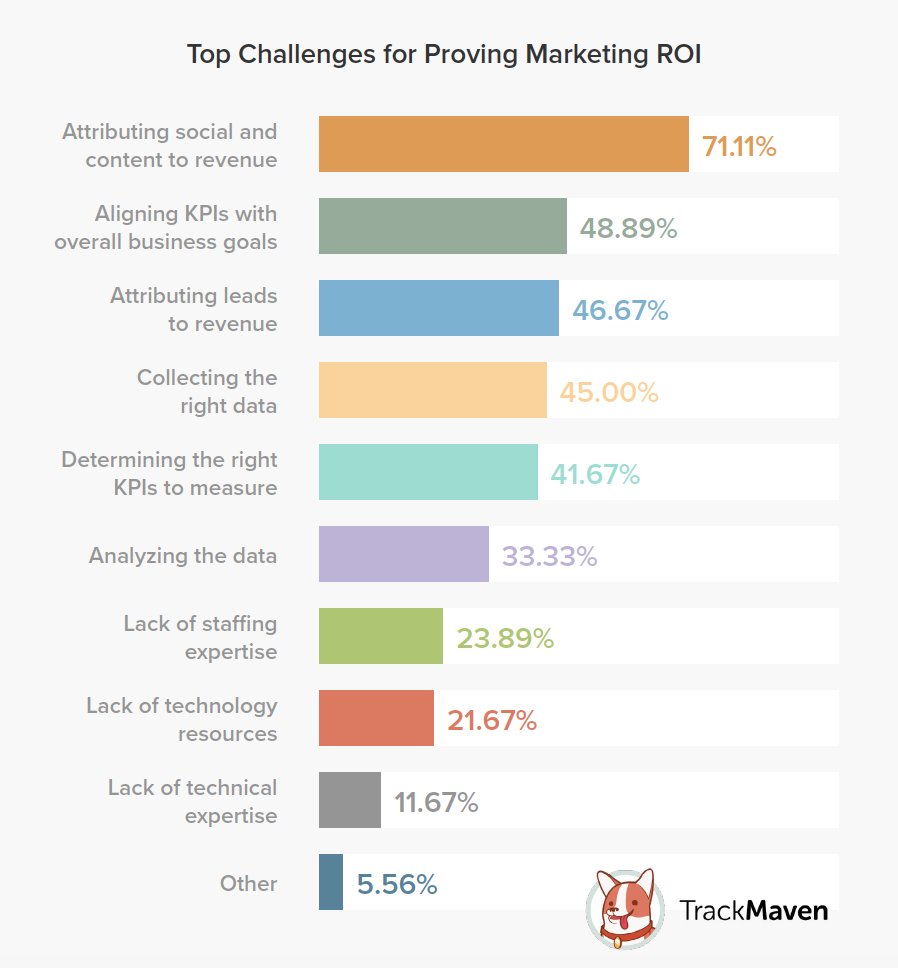Data-driven management is essential to mobilize and motivate a well-oiled marketing team. Equip yourself with actionable strategies, technology recommendations, and budgeting trends in TrackMaven’s 2017 Marketing Leadership Survey.
Studies (and common sense) tell us that when marketing is aligned with cross-functional teams, businesses see faster revenue growth and higher profitability. With all of this evidence, surely marketing leaders are aware of the importance of alignment as a business driver?
Our research says otherwise. In fact, there are three major ways that misalignment sabotages the performance of even the most adept marketing leaders.
1. Marketing leaders are not aligning incentives with goals around driving sales.
Not surprisingly, marketers say their top objective is to increase sales. However, when it comes to compensating their marketing teams, only about 23 percent of marketing leaders compensate based on revenue or closed business.
Clear expectations (and incentives) are critical to motivate any human being. By failing to tie sales objectives to team compensation, marketing leaders are setting disjointed expectations and sowing the seeds for a demotivated workforce.
2. Marketing leaders are not aligning metrics with sales goals.
We discovered even further misalignment when we dug into marketers’ views and practices around metrics and sales goals. While 61 percent of marketers say their focus is on increasing sales, many fall back on easy-to-measure vanity metrics, such as consumption, instead of more relevant leads and sales metrics.
If you cannot connect your metrics to your core objectives, are they worth measuring in the first place? Unless you have an attribution tool in place to connect activities to outcomes, your team is likely guilty of reporting for reporting’s sake. Invest the time to connect your top-of-funnel metrics to bottom-of-funnel outcomes.
3. Marketing leaders don’t have the right analytics in place to prove marketing performance.
While 66 percent of marketers view analytics as strategically important, AND believe that it’s easier to prove marketing impact today than in the past, only about 28 percent are satisfied with their ability to measure performance.
Most, as you can see in the chart below, say they’re only somewhat effective at demonstrating value.
Put differently, marketers say that analytics are strategically important, and are optimistic about the ability to prove ROI — but in reality, few marketers are happy with their ability to measure performance.
This finding points to a misalignment between marketing objectives and the tools they rely on to accomplish those objectives. So why the discrepancy?
To dig a little deeper, we asked marketers to tell us what their biggest challenges are when endeavoring to prove marketing ROI.
The highest hurdle, they say, pertains to an inability to attribute top-of-funnel activities to business outcomes: 71.11 percent of marketing leaders say difficulties attributing social and content to revenue is their top challenge for proving ROI.
Other ROI issues include aligning KPIs with overall business goals (48.89 percent), attributing leads to revenue (46.67 percent), and collecting the right data (45 percent).
If any of these ROI-related issues resonate with you, TrackMaven’s marketing analytics platform is uniquely equipped to help. Request your guided tour of our platform, or visit our product page to learn more.
Is your business a victim of misalignment sabotage?
The 2017 Marketing Leadership Survey: Strategy, Technology, and Data-Driven Management also drills down into how many companies are truly data-driven, how marketers spend their workweek, reporting tools and best practices, budgeting trends, and more.
Here’s a quick rundown of what you’ll discover when you download the study:
- The top marketing goals and objectives of today’s marketing leaders, including priorities for social media, demand generation, brand awareness, and more.
- How leaders prove marketing ROI, including the biggest challenges and discrepancies in ROI data and the metrics they rely on to demonstrate marketing value.
- A leadership perspective on which tools and technologies marketing leaders find most important for measuring marketing performance.
To find out more about the practices and views of today’s marketing leaders, download your free copy of the 2017 Marketing Leadership Survey today.




